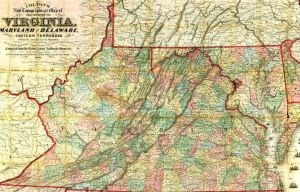 The First Baptist Church West Main Street, Charlottesville, Virginia, an African American congregation, traces its beginnings to March 16, 1863. That was the day that some 800 black members of the Charlottesville Baptist Church petitioned the church’s white leaders to allow them to form their own congregation.
The First Baptist Church West Main Street, Charlottesville, Virginia, an African American congregation, traces its beginnings to March 16, 1863. That was the day that some 800 black members of the Charlottesville Baptist Church petitioned the church’s white leaders to allow them to form their own congregation.
Today their request is finally granted, and the black congregation becomes a separate entity from the mother church. The new congregation, at its founding one of the largest Baptist congregations in the city, continues meeting in the Charlottesville Baptist meeting house until late August, at which time they purchase the old Delevan Hotel on West Main Street. The congregation dedicates their first building in 1884, taking the name First Colored Baptist Church of Charlottesville. Later the church name is changed to First Baptist Church West Main Street.
While black Baptists in Charlottesville celebrate their spiritual autonomy, U.S. President Abraham Lincoln officially puts an end to a congressional attempt to preempt his Southern reconstruction efforts. The Wade-Davis Bill, crafted by Radical Republicans, was based on a view that the president’s reconstruction plan was too lenient. Insisting that the eleven rebellious states were not entitled to representation in the electoral college, the bill annulled the already-reconstructed states of Louisiana and Arkansas (and put on hold Tennessee’s efforts). In addition, the Wade-Davis Bill was predicated upon the belief that Congress could abolish slavery in the Southern states.
Lincoln disagreed, insisting that his plan was more prudent and that slavery could only be abolished by an amendment to the Constitution. Today he vetoes the congressional bill and issues the following proclamation:
By the President of the United States of America
A ProclamationWhereas at the late session Congress passed a bill “to guarantee to certain States whose governments have been usurped or overthrown a republican form of government,” a copy of which is hereunto annexed; and
Whereas the said bill was presented to the President of the United States for his approval less than one hour before the sine die adjournment of said session, and was not signed by him; and
Whereas the said bill contains, among other things, a plan for restoring the States in rebellion to their proper practical relation in the Union, which plan expresses the sense of Congress upon that subject, and which plan it is now thought fit to lay before the people for their consideration:
Now, therefore, I, Abraham Lincoln, President of the United States, do proclaim, declare, and make known that while I am (as I was in December last, when, by proclamation, I propounded a plan for restoration) unprepared by a formal approval of this bill to be inflexibly committed to any single plan of restoration, and while I am also unprepared to declare that the free State constitutions and governments already adopted and installed in Arkansas and Louisiana shall be set aside and held for naught, thereby repelling and discouraging the loyal citizens who have set up the same as to further effort, or to declare a constitutional competency in Congress to abolish slavery in States, but am at the same time sincerely hoping and expecting that a constitutional amendment abolishing slavery throughout the nation may be adopted, nevertheless I am fully satisfied with the system for restoration contained in the bill as one very proper plan for the loyal people of any State choosing to adopt it, and that I am and at all times shall be prepared to give the Executive aid and assistance to any such people so soon as the military resistance to the United States shall have been suppressed in any such State and the people thereof shall have sufficiently returned to their obedience to the Constitution and the laws of the United States, in which cases military governors will be appointed with directions to proceed according to the bill.
In testimony whereof I have hereunto set my hand and caused the seal of the United States to be affixed.
Done at the city of Washington, this 8th day of July, A. D. 1864, and of the Independence of the United States the eighty-ninth.
ABRAHAM LINCOLN.
By the President:
WILLIAM H. SEWARD,
Secretary of State.
In the midst of disagreements over the manner of reconstruction is the widespread belief that victory over the Confederacy is not only inevitable, but eminent.
Sources: “First Baptist Church (West Main Street),” CvillePedia (link); “Wade-Davis Bill” (link); Abraham Lincoln, “Proclamation 115 – Concerning a Bill “To Guarantee to Certain States, Whose Governments Have Been Usurped or Overthrown, a Republican Form of Government,” and Concerning Reconstruction,” July 8, 1864 (link)


